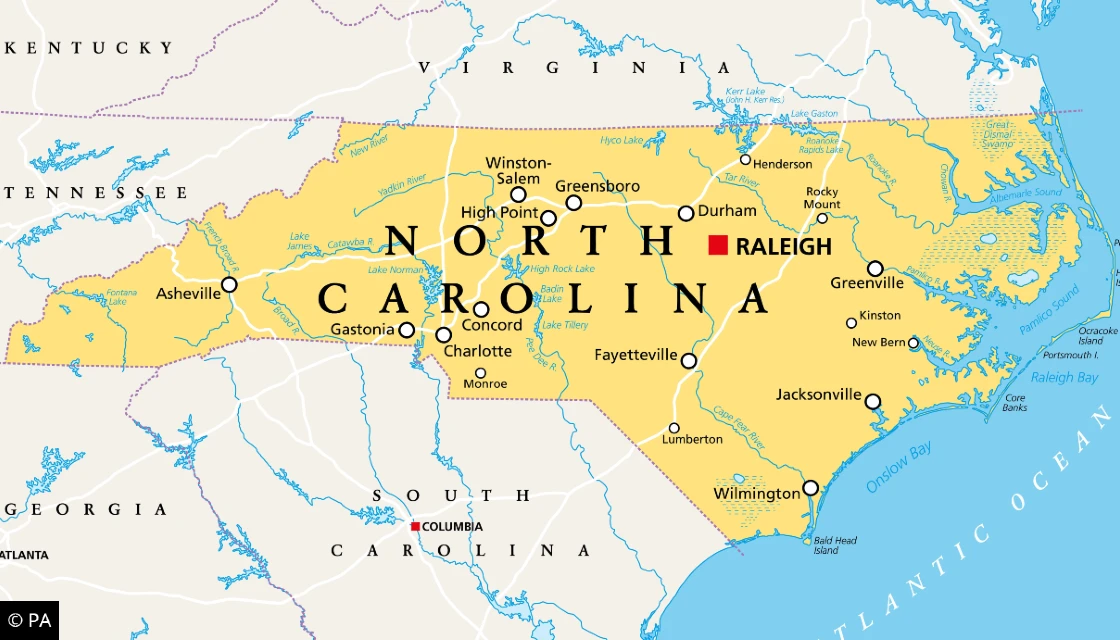Basketball tradition runs deep in the Tar Heel State, with two of the game’s most iconic programs, North Carolina and Duke, separated by just an 11 mile drive across the Triangle.
🔌 Shameless Plug: Check Out The Latest Duke-UNC Odds
With 11 combined national titles, the schools have a rich history and would garner significant attention across North Carolina sports betting, but where do they stand versus other top teams in the modern era?
BetCarolina.com set out to answer this and define what constitutes a modern blue-blood program using a points system it created.
Starting with the 2011-12 season, points were awarded to each program in the following areas: national championship wins (10 per win), national championship appearances (5 per appearance), Final Four appearances (4 per appearance), NCAA Tournament appearances (1 per appearance) and top 25 recruiting finishes (1 for each year with a recruiting class ranked in the top 25 by the 247Sports Composite), with 35 points as the baseline for blue-blood status.
College Basketball’s Current Breed of Elite
UNC (57 Points)
The Carolina Way continues to embody success. UNC is one of just four programs (along with Kansas, Michigan State and Gonzaga) to make the NCAA Tournament every year since 2012 thanks to their lone losing season of the decade occurring in 2020 when the COVID-19 pandemic forced the cancellation of postseason play.
The UNC Tar Heels took home the 2017 National Title and came within a few plays of winning it all in 2016 and 2022. These runs came under vastly different circumstances, too.
While they were a No. 1-seed in both 2016 and 2017, the 2017 team had to carry the weight of losing on a buzzer-beater as the favorites the previous year while dealing with the graduation of two of their three leading scorers.
Though they returned 64.4% of their minutes in 2017 per Kenpom.com, first team All-American Brice Johnson and two-time All-ACC selection Marcus Paige left big shoes to fill.
Nonetheless, Justin Jackson blossomed into a first team All-American himself and Joel Berry earned the first of his two All-ACC nods as Roy Williams led the team to the third championship of his tenure.
Coach Williams retired following the 2021 season, but Hubert Davis, his assistant of nine years, took over and led North Carolina to a championship date with Kansas as an 8-seed (after two remarkable wins against the retiring Mike Krzyzewski of course). Though the Jayhawks ultimately prevailed by three, it still made the Tar Heels the only team with three title game appearances since 2012.
While Villanova has the edge on recent championships, North Carolina takes first place in these rankings thanks to its recruiting efforts putting it over the top.
The Tar Heels have signed a top 25 class every year since 2011 except for 2015, whereas the Wildcats have only signed four top 25 classes over the period examined.
Duke (42 points)
It has been frustrating at times for Duke recently, but the results speak for themselves.
Though they have only made two trips to the Final Four since 2011-12 versus three for North Carolina, the Duke Blue Devils have a better record than their rivals in Chapel Hill over that timespan (302-84 vs. 289-111).
Despite this lofty .782 overall winning percentage, Duke’s only regular season ACC title during this stretch came last year, 16 years after their last outright league championship (they shared the 2010 ACC title with Maryland).
Meanwhile, the Tar Heels have won or shared four ACC regular season championships since 2011-12, while Virginia has won or shared five. The Blue Devils finished second in the league to the Cavaliers in 2014-15 before making their run to Mike Krzyzewski’s fifth and final national championship.
Star freshmen Jahlil Okafor, Tyus Jones and Justise Winslow led that team, which remains of one of only two freshmen dominated teams to win a title. As Duke embraced one and done prospects like this, it tightened their grasp on the top of the recruiting rankings, but also left them susceptible to tournament upsets at times.
Duke has signed a top 10 class every year since 2011, except for the 2012 class which ranked 41st. And even that class was tied for second nationally by average recruit rating, it was simply a small class containing two top-30 prospects (Rasheed Sulaimon and Amile Jefferson).
Stars like Zion Williamson, Jayson Tatum and Marvin Bagley have dazzled spectators in Durham to the tune of eight top 10 Associated Press poll finishes since 2011-12, but the Blue Devils have also lost five NCAA tournament games to lower seeded teams since then and saw their streak of 24 consecutive tournament appearances snapped in 2020-21 while relying on a freshmen heavy roster.
Once sports betting does eventually come to the great state of North Carolina, this site will be your home for the best North Carolina sports betting apps.







